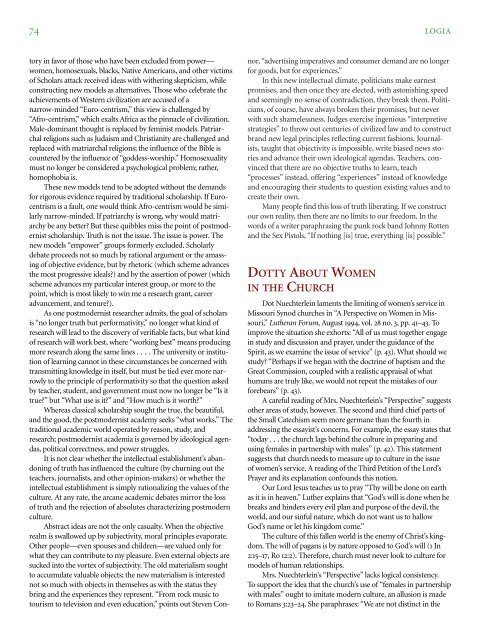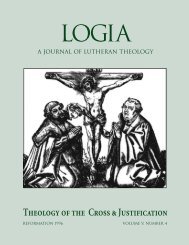04-2 Hermeneutics.pdf
04-2 Hermeneutics.pdf
04-2 Hermeneutics.pdf
- No tags were found...
Create successful ePaper yourself
Turn your PDF publications into a flip-book with our unique Google optimized e-Paper software.
74 LOGIAtory in favor of those who have been excluded from power—women, homosexuals, blacks, Native Americans, and other victimsof Scholars attack received ideas with withering skepticism, whileconstructing new models as alternatives. Those who celebrate theachievements of Western civilization are accused of anarrow-minded “Euro-centrism,” this view is challenged by“Afro-centrism,” which exalts Africa as the pinnacle of civilization.Male-dominant thought is replaced by feminist models. Patriarchalreligions such as Judaism and Christianity are challenged andreplaced with matriarchal religions; the influence of the Bible iscountered by the influence of “goddess-worship.” Homosexualitymust no longer be considered a psychological problem; rather,homophobia is.These new models tend to be adopted without the demandsfor rigorous evidence required by traditional scholarship. If Eurocentrismis a fault, one would think Afro-centrism would be similarlynarrow-minded. If patriarchy is wrong, why would matriarchybe any better? But these quibbles miss the point of postmodernistscholarship. Truth is not the issue. The issue is power. Thenew models “empower” groups formerly excluded. Scholarlydebate proceeds not so much by rational argument or the amassingof objective evidence, but by rhetoric (which scheme advancesthe most progressive ideals?) and by the assertion of power (whichscheme advances my particular interest group, or more to thepoint, which is most likely to win me a research grant, careeradvancement, and tenure?).As one postmodernist researcher admits, the goal of scholarsis “no longer truth but performativity,” no longer what kind ofresearch will lead to the discovery of verifiable facts, but what kindof research will work best, where “working best” means producingmore research along the same lines . ... The university or institutionof learning cannot in these circumstances be concerned withtransmitting knowledge in itself, but must be tied ever more narrowlyto the principle of performativity so that the question askedby teacher, student, and government must now no longer be “Is ittrue?” but “What use is it?” and “How much is it worth?”Whereas classical scholarship sought the true, the beautiful,and the good, the postmodernist academy seeks “what works.” Thetraditional academic world operated by reason, study, andresearch; postmodernist academia is governed by ideological agendas,political correctness, and power struggles.It is not clear whether the intellectual establishment’s abandoningof truth has influenced the culture (by churning out theteachers, journalists, and other opinion-makers) or whether theintellectual establishment is simply rationalizing the values of theculture. At any rate, the arcane academic debates mirror the lossof truth and the rejection of absolutes characterizing postmodernculture.Abstract ideas are not the only casualty. When the objectiverealm is swallowed up by subjectivity, moral principles evaporate.Other people—even spouses and children—are valued only forwhat they can contribute to my pleasure. Even external objects aresucked into the vortex of subjectivity. The old materialism soughtto accumulate valuable objects; the new materialism is interestednot so much with objects in themselves as with the status theybring and the experiences they represent. “From rock music totourism to television and even education,” points out Steven Con-nor, “advertising imperatives and consumer demand are no longerfor goods, but for experiences.”In this new intellectual climate, politicians make earnestpromises, and then once they are elected, with astonishing speedand seemingly no sense of contradiction, they break them. Politicians,of course, have always broken their promises, but neverwith such shamelessness. Judges exercise ingenious “interpretivestrategies” to throw out centuries of civilized law and to constructbrand new legal principles reflecting current fashions. Journalists,taught that objectivity is impossible, write biased news storiesand advance their own ideological agendas. Teachers, convincedthat there are no objective truths to learn, teach“processes” instead, offering “experiences” instead of knowledgeand encouraging their students to question existing values and tocreate their own.Many people find this loss of truth liberating. If we constructour own reality, then there are no limits to our freedom. In thewords of a writer paraphrasing the punk rock band Johnny Rottenand the Sex Pistols, “If nothing [is] true, everything [is] possible.”DOTTY ABOUT WOMENIN THE CHURCHDot Nuechterlein laments the limiting of women’s service inMissouri Synod churches in “A Perspective on Women in Missouri,”Lutheran Forum, August 1994, vol. 28 no. 3, pp. 41–43. Toimprove the situation she exhorts: “All of us must together engagein study and discussion and prayer, under the guidance of theSpirit, as we examine the issue of service” (p. 43). What should westudy? “Perhaps if we began with the doctrine of baptism and theGreat Commission, coupled with a realistic appraisal of whathumans are truly like, we would not repeat the mistakes of ourforebears” (p. 43).A careful reading of Mrs. Nuechterlein’s “Perspective” suggestsother areas of study, however. The second and third chief parts ofthe Small Catechism seem more germane than the fourth inaddressing the essayist’s concerns. For example, the essay states that“today . . . the church lags behind the culture in preparing andusing females in partnership with males” (p. 42). This statementsuggests that church needs to measure up to culture in the issueof women’s service. A reading of the Third Petition of the Lord’sPrayer and its explanation confounds this notion.Our Lord Jesus teaches us to pray “Thy will be done on earthas it is in heaven.” Luther explains that “God’s will is done when hebreaks and hinders every evil plan and purpose of the devil, theworld, and our sinful nature, which do not want us to hallowGod’s name or let his kingdom come.”The culture of this fallen world is the enemy of Christ’s kingdom.The will of pagans is by nature opposed to God’s will (1 Jn2:15–17, Ro 12:2). Therefore, church must never look to culture formodels of human relationships.Mrs. Nuechterlein’s “Perspective” lacks logical consistency.To support the idea that the church’s use of “females in partnershipwith males” ought to imitate modern culture, an allusion is madeto Romans 3:23–24. She paraphrases: “We are not distinct in the
















